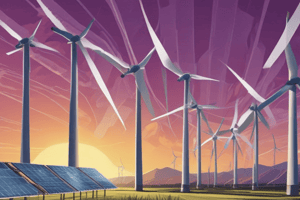Podcast
Questions and Answers
What is the primary form of energy that powers most household devices?
What is the primary form of energy that powers most household devices?
- Solar Energy
- Wind Energy
- Geothermal Energy
- Electrical Energy (correct)
Which energy resource is considered renewable?
Which energy resource is considered renewable?
- Coal
- Natural Gas
- Solar Energy (correct)
- Nuclear Energy
What is one major disadvantage of fossil fuel energy resources?
What is one major disadvantage of fossil fuel energy resources?
- They are readily available
- They are renewable
- They contribute to air pollution (correct)
- They are inexpensive to extract
What is the purpose of energy conservation?
What is the purpose of energy conservation?
Which of the following is a non-renewable energy resource?
Which of the following is a non-renewable energy resource?
Flashcards
What is energy?
What is energy?
Energy is the ability to do work or cause change. It's like a force that can make things happen!
Potential vs. Kinetic energy?
Potential vs. Kinetic energy?
Energy can be stored in different forms. Think of 'potential' as stored energy, like a stretched rubber band, and 'kinetic' as energy in motion, like the rubber band flying across the room.
Energy Transformation
Energy Transformation
Energy can be transferred from one form to another or from one object to another. This is why you can heat up a pot of water with fire, for example.
Renewable vs. Non-Renewable Energy
Renewable vs. Non-Renewable Energy
Signup and view all the flashcards
Why are energy resources important?
Why are energy resources important?
Signup and view all the flashcards
Study Notes
Energy and Energy Resources - Year 9 Podcast Notes
-
Energy is the ability to do work or cause change. It exists in various forms, including kinetic (energy of motion), potential (stored energy), thermal (heat energy), chemical (energy stored in bonds), light (radiant energy), and electrical energy.
-
We use energy for many things in our daily lives, from powering our homes and transportation to running factories and producing goods. Understanding energy and its sources is crucial.
-
Different types of energy are harnessed from different resources. These resources can be categorized as renewable or non-renewable.
Renewable Energy Resources
-
Renewable energy resources are naturally replenished over relatively short periods of time. They are usually sustainable and don't run out, making them a vital part of a sustainable energy future.
-
Examples of renewable energy include:
-
Solar energy: Harnessing the sun's energy using photovoltaic cells or concentrating solar power. Sunlight is converted into electricity.
-
Wind energy: Using wind turbines to convert wind's kinetic energy into electricity.
-
Hydropower: Utilizing the energy of flowing water (usually from dams) to drive turbines and generate electricity.
-
Biomass: Using organic matter like wood, crops, or waste to produce energy through burning or other processes. The energy in biomass comes from the sun.
-
Geothermal energy: Harnessing heat from the Earth's interior for electricity generation or heating. Hot water or steam can be used for energy.
-
Ocean energy: Using waves, tides, or ocean currents to produce electricity.
-
Advantages of renewable energy include reducing our reliance on fossil fuels, minimizing pollution, creating new jobs, and easing pressure on our planet.
Non-Renewable Energy Resources
-
Non-renewable resources are those that are not replaced at a rate comparable to their use. They will eventually run out.
-
Examples of non-renewable energy include:
-
Fossil fuels: These are the most common type of non-renewable energy source. They include coal, oil, and natural gas. They formed millions of years ago from ancient plants and animals, trapped and compressed underground. Burning fossil fuels releases significant pollution into the atmosphere contributing to greenhouse gas emissions and climate change.
-
Advantages of non-renewable energy sources are typically their higher energy density and relatively lower cost per unit of energy. Disadvantages include their finite supply and the damaging environmental impacts of burning them.
Energy Conversion and Efficiency
-
Energy conversion is the process of changing energy from one form to another. For example, a hydroelectric dam converts the potential energy of water into the kinetic energy of moving water, which in turn drives turbines to create electrical energy.
-
Energy efficiency refers to how effectively energy is used to achieve a task or produce a required output. High efficiency means that less energy is wasted as heat or other unusable forms of energy.
Energy Conservation
-
Energy conservation involves reducing energy consumption to lessen negative effects on the environment and resources. This can be done through individual actions or governmental policies.
-
Examples of energy conservation methods include:
-
Improving energy efficiency in buildings.
-
Using public transport or biking instead of individual vehicles(cars/motorcycles etc.).
-
Turning off lights and electronics when not in use.
-
Using energy-efficient appliances.
-
Properly sealing windows and doors.
The Energy Future
-
The future of energy requires a shift towards renewable energy sources and sustainable practices for a cleaner and healthier environment.
-
Developing and implementing innovative energy technologies, improving energy efficiency, and investing in research and development are crucial to dealing with the climate crisis and creating a sustainable future.
-
Education about the importance of energy and its impact on our lives are vital in creating a future with responsible energy management.
Studying That Suits You
Use AI to generate personalized quizzes and flashcards to suit your learning preferences.





